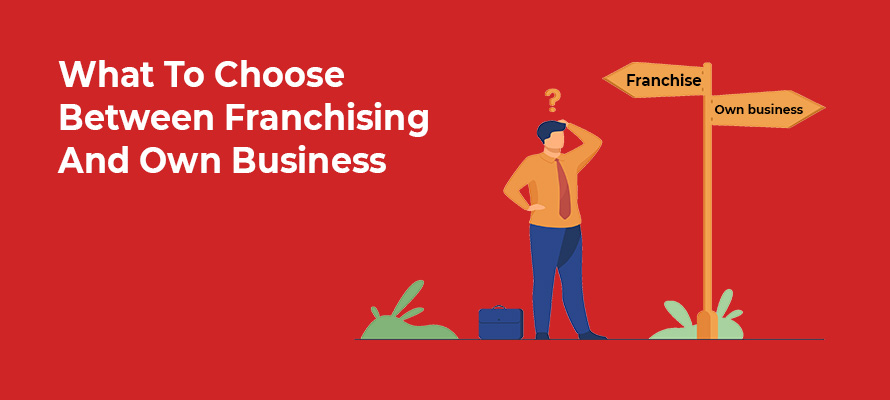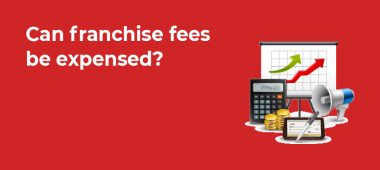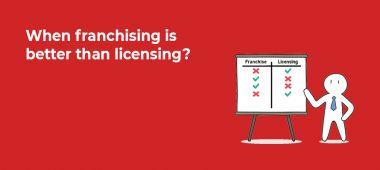First-time entrepreneurs are often in a dilemma about whether to start your own business from scratch or purchase a franchise. Both businesses have their own set of pros and cons. In your own business, you are the boss and not answerable to anyone. In a franchise, you work under a franchisor and have to pay a royalty fee to the brand every month.
To choose one of these business models one first needs to know the features, advantages as well as disadvantages of each. In this article, we see the major differences between owning a franchise business and traditional business to help you make a clear choice.
Franchising
Franchise business is a commercial relationship agreement between a parent company called the franchisor and an individual business unit called the franchisee. The franchisee obtains the licensed privilege of using the brand’s trademark. In return, a royalty fee has to be paid to the franchisor every month or quarter.
Features of the franchise business model are as follows:
- A franchise relationship starts by signing an agreement where the terms and conditions of the association are laid down.
- The average duration of a term in the franchise business is 5 years. The contract can be renewed with the mutual consent of both parties.
- The franchisee needs to give an undertaking in which they agree not to involve in any competing business during the term of the agreement. The franchisor gives an undertaking not to terminate the agreement before the expiry of the term.
- The agreement requires the franchisee to pay a monthly or quarterly royalty fee to the franchisor.
- The franchisor provides support to the franchisee for organizing, management, and merchandising the products. The business is set up by the franchisor for the franchisee to meet the brand standards.
- A franchisee must follow the business model which has been tried and tested by the organization.
Own business
When you want to start a business of your own, you have to begin from scratch. For the ones with experience in the industry and ample resources, starting from scratch can be exciting. However, for some, it might be intimidating.
If you have a unique business idea and wish to have total control of the business, then starting your own business can be a good choice for you.
Features of own business:
- The business system and procedures are decided solely by the owner.
- The owner is responsible for all business-related decisions.
- The profit you make entirely belongs to you. There is no royalty fee to be paid to any organization.
- The idea belongs to the owner and he is free to take any step necessary for the fulfillment of the goal.
- If the business becomes successful, you can start selling franchises to increase your sales. This will earn you a royalty fee from the franchisees.
Factors to differentiate between franchising and own business
The pros and cons of both business models can be compared based on the following factors:
Brand awareness
The advantage of owning a franchise is the brand recognition that comes along with it. The franchise organization has an established business and its brand image is a popular one. When you own a franchise of such an organization you already have an existing customer base that seeks out reliability and familiarity of the brands. The uniformity across all the franchises proves to be an advantage for the new franchisees.
When starting your own business, you might not have this benefit. One needs to work hard to establish a brand image and set up a customer base.
Degree of control
With your own business, you have control over every small as well as large aspect of the business. This is a major advantage of owning a business.
In the franchise structure, one has to sign an agreement that lays down the rules and regulations that franchisees must follow. The operating system of the business is decided by the franchise organization. The franchisee can control the culture and values of the business and the hiring or firing process. However, one does not have as much control as the business owner himself.
Operating system
With a franchise you get a complete, tried, and tested operating system. The system has been built over the years and therefore, guarantees success. If you want this security while starting a business, then the franchise business model can be a good choice for you.
If you are creative, innovative, and like to build your own system, then go for a start-up. You are free to decide how your business will run and there is no specific set of rules and regulations to follow.
Supplies and equipment
When starting your own business, you have to do thorough research on what equipment to buy, which suppliers to contact and negotiation of deals. The cost of setting up and purchasing the equipment will be your responsibility.
With a franchise, you can get ample support from the franchisor when purchasing equipment or looking for supplies. They can help you get items at discounted rates.
Economies of the scale
When you have a start-up business your buying power is limited to one. It is sometimes difficult to gain the trust of suppliers when new in the business. In this matter, franchisees have an advantage over the solo entrepreneurs. The franchisor can get lower rates because of the volume and help you save money. It is easy for suppliers to extend credits when you have the trust of a reputed organization. Your buying power expands when in a franchise organization and so does the profit.
Financing
Starting your own business from scratch can be a costly affair when compared to franchising. A solo entrepreneur will need start-up capital for retail space and equipment. A franchisor does not supply financing, but they have relationships with lenders who will lend money to the franchisee based on the brand’s referrals. When a popular brand name is associated with your business, financing becomes easier. For beginners with insufficient funds, a franchise business is a good starting point.
Marketing
In the franchise model, you have the brand’s national as well as regional marketing and advertising to boost the business. The franchise organization will take all appropriate measures to ensure their franchisees have a wide promotion. However, there is a price every franchisee must pay for this support in the form of a royalty fee to the franchisor.
With your own business, marketing and advertising are your lookouts. One has to promote his own business and all costs of marketing are for the owner to bear.
Legal disclosure
In the franchise business, franchisors are supposed to disclose some information regarding their business under the state and federal laws. In your own business, you don’t have any such requirement.
Training
When you join a franchise, the franchisor provides extensive training on every aspect of the business, like managing style, hiring and training staff, marketing, advertising, etc. With your business, you learn all of it on your own. The “rookie mistakes” will be a part of this learning curve.
Support from franchisor
When running a business people get caught up with the daily tasks of managing taxes and supplies. The development as leaders and executives lacks behind. A franchisor provides filed support specialists to train the franchisees to become better managers and leaders. With start-ups this is not the case, one needs to manage things himself without any training.
Peer support
When you own a business, you can join local or regional business organizations or Rotary so that you are not alone. In the franchise world, there is constant support from the franchisor as well as the fellow franchisees at a local, regional, and national level.
Product innovation
When big brands introduce new products or services they test it in their company stores or with the franchisees willing to test. Once successful they launch it at all levels. The franchisee might have to spend some amount bringing in new equipment to accommodate the change.
In the traditional business set up if the product innovation does not work out then the owner has to bear all the loss of money as well as time.
Culture
In the franchisor-franchisee relationship, success depends on both parties. The franchisee needs to align his values and goals with that of the franchisor. When it’s your own business you only need to get along with yourself and your staff and customers.
Exit strategy
Trying to sell an individual business unit can be a tough job. People usually prefer buying business of known brands that they can trust. In a franchise, if you can’t find a buyer then the franchisor is always there. You can also leave once your contract term is over.
Conclusion
Whichever path you choose, it has its own benefits and risks. A self-assessment is a must before taking up a business, whether a franchise or a traditional one. The pros and cons should be estimated based on your personal goals and values. Detailed research is also necessary before making a choice.















